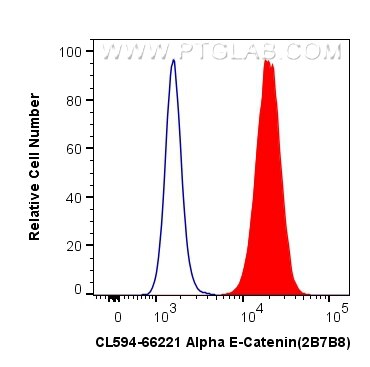CoraLite®594-conjugated Alpha E-Catenin Monoclonal antibody
Alpha E-Catenin Monoclonal Antibody for FC (Intra)
Host / Isotype
Mouse / IgG1
Reactivity
human, mouse
Applications
FC (Intra)
Conjugate
CoraLite®594 Fluorescent Dye
CloneNo.
2B7B8
Cat no : CL594-66221
Synonyms
Validation Data Gallery
Tested Applications
| Positive FC detected in | MCF-7 cells |
Recommended dilution
| Application | Dilution |
|---|---|
| Flow Cytometry (FC) | FC : 0.80 ug per 10^6 cells in a 100 µl suspension |
| It is recommended that this reagent should be titrated in each testing system to obtain optimal results. | |
| Sample-dependent, Check data in validation data gallery. | |
Product Information
CL594-66221 targets Alpha E-Catenin in FC (Intra) applications and shows reactivity with human, mouse samples.
| Tested Reactivity | human, mouse |
| Host / Isotype | Mouse / IgG1 |
| Class | Monoclonal |
| Type | Antibody |
| Immunogen | Alpha E-Catenin fusion protein Ag23603 |
| Full Name | catenin (cadherin-associated protein), alpha 1, 102kDa |
| Calculated Molecular Weight | 906 aa, 100 kDa |
| Observed Molecular Weight | 95-100 kDa |
| GenBank Accession Number | BC031262 |
| Gene Symbol | CTNNA1 |
| Gene ID (NCBI) | 1495 |
| Conjugate | CoraLite®594 Fluorescent Dye |
| Excitation/Emission Maxima Wavelengths | 588 nm / 604 nm |
| Form | Liquid |
| Purification Method | Protein G purification |
| Storage Buffer | PBS with 50% Glycerol, 0.05% Proclin300, 0.5% BSA, pH 7.3. |
| Storage Conditions | Store at -20°C. Avoid exposure to light. Stable for one year after shipment. Aliquoting is unnecessary for -20oC storage. 20ul sizes contain 0.1% BSA. |
Background Information
Alpha catenin is an essential component of adherens junctions that connects E-cadherin-β-catenin complexes with the actin cytoskeleton. It also recruits a range of other important proteins to developing intercellular junctions. Three alpha catenins exist in human: alpha-E-catenin, alpha-N-catenin, and alpha-T-catenin, which share substantial amino-acid sequence similarity but have distinct tissue distribution. alpha-E-catenin is ubiquitously expressed, alpha-N-catenin is restricted to neuronal tissue, and alpha-T-catenin is primarily expressed in heart tissue. Reduced levels of alpha-E-catenin protein seem to be characteristic of many different human cancers, including malignant tumours of the breast, colon, stomach, oesophagus, bladder and liver. In addition, the loss of alpha-E-catenin often correlates with the degree of tumour differentiation and metastasis.
Protocols
| Product Specific Protocols | |
|---|---|
| FC protocol for CL594 Alpha E-Catenin antibody CL594-66221 | Download protocol |
| Standard Protocols | |
|---|---|
| Click here to view our Standard Protocols |


